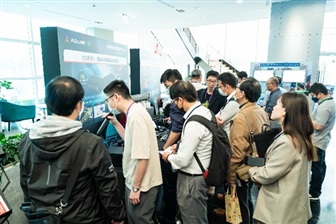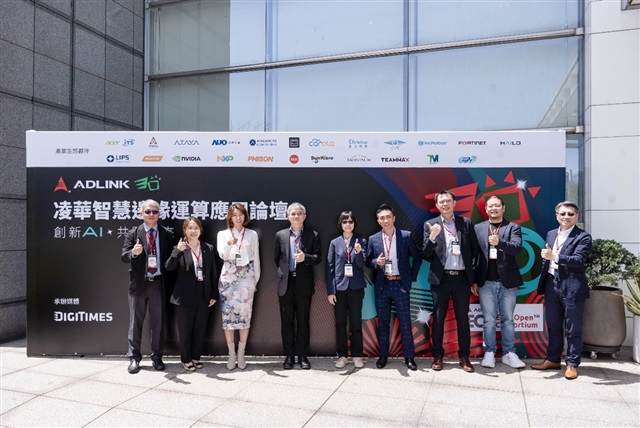AI computing is gradually expanding from cloud to edge; enterprises are accelerating decision-making efficiencies and reducing operational costs through Edge AI, while driving innovation and growth in fields including semiconductor manufacturing, automotive applications and robotics. This has become the key technology for dual transformation in both digitalization and sustainability. ADLINK Technology held the "Smart Edge Computing Applications Forum" on April 15th, bringing together 23 ecosystem partners and attracted more than 270 tech industry elites and technical leaders to participate. Many industry experts were also invited to share the latest trends and application examples of edge computing to help the industry grasp the technological development trends.

Credit: ADLINK
Open ecosystem connects industrial co-creation
Edge AI starts a new trend of digital transformation
ADLINK Taiwan's General Manager of IoT Solution & Technology Business Unit, Ethan Huang, stated that this forum aims to embody the spirit of the ADLINK EdgeOpen™ Consortium (EOC) platform, to transform an open ecosystem into close partnerships, and strengthen value chain, joint marketing, and technical innovation to generate synergistic effects. ADLINK has established global layout, adopted the High-Mix Low-Volume production model, and is actively expanding its automotive electronics production lines. To promote growth, ADLINK focuses on four major strategies: Develop HAI (Hybrid AI) products, promote Display + Computer integration applications, expand DMS+ design and manufacturing services, and deepen its engagement in the vertical market. As for the technical aspect, it has core advantages including high speed signal testing, multi-modular platforms and Edge AI integration, etc. He emphasized that integrating algorithms, data, computing power and industry know-how will become the driving force of the smart era.
Experts analyze industry transformation paths
Generative AI, smart machines and net zero transformation become the focus
Many industry experts were invited to the trend forum to have in-depth analysis on the latest trends and application examples on diverse aspects including generative AI, smart robots, semiconductor equipment to sustainable net zero.
The Chief Technical Officer of Phison Electronics Corp, Wei Lin, shared on the aiDAPTIV+ memory architecture, helping enterprises achieve large model training and fine-tuning with lower costs, accelerating the popularization of generative AI, and promoting the implementation of AI sovereignty. The Managing Director and Partner of the Boston Consulting Group, Mei-Jung Chen, pointed out that AI technology is currently rapidly evolving from rule-based algorithms into generative AI, and is gradually marching towards the Agentic AI era with multi-agent collaboration. She suggested enterprises to focus on three major directions during the early stages of promoting AI transformation: Efficiency improvement, functional reshaping and cost optimization.

Credit: ADLINK
Focus on the development of smart machines and sustainable applications. The distinguished professor of National Taiwan University Department of Mechanical Engineering, Pei-Chun Lin, stated that the combination of AI and automation will push robots into industrial cores and become the turning point of industries. The matured RGB-D vision technology and the improved motor performance enhanced the dynamic responsiveness of robots; however, the costs of LiDAR and tactile technology are still high, and processing technologies such as metal 3D printing still require breakthroughs. The focus should be on safe collaboration, green operation, full automation and multi-field applications in the future, and integrate AI with high-reliability systems in order to widely deploy fully autonomous robots. Wen-Chi Chang, Research Manager at the Industrial Technology Research Institute (ITRI), stated that AI integration will become a prerequisite for semiconductor equipment. She summarized the applications of the four major key technologies of AI, which includes integrating machine vision with vision language models, integrating digital twin with AI predictive maintenance, integrating industrial data with big language model analysis, and to integrate reinforced learning with autonomous robotic arm control. Deloitte Taiwan's Vice President of Risk Advisory Services, Cathy Lee, suggested that enterprises can take five steps to promote net zero transformation, which include commitment to vision, development strategy, integration of the organization's development model, strengthen execution capabilities, to monitoring and disclosing regularly. Funding tools such as purchasing of green electricity, carbon pricing, green bonds and sustainable loans should be also be adopted to enhance climate resilience and green competitiveness.
In addition to the trend forum, activities also included the "Industry X Application Technology Seminar", where experts from MediaTek, NXP Semiconductors, ATAYA, Acer ITS, Hailo, SEIT, FARobot, AUO, AUO Digitech, Avalanche Computing Taiwan, Techman Robot, EGK, Tallgeese AI, AIWIN Technology, BRICKS Display, Fortinet, Chroma ATE, and National Yang Ming Chiao Tung University were invited and participated in in-depth discussions on the latest development of Edge AI technology through the three major topics of "The driving forces of smart manufacturing", "Smart cities and automotive", and "Edge AI platform innovation and generative AI applications", and shared practical application examples and solutions.
There were also booths set up on-site from SunWare, Mercury CYU International, LIPS Corporation, WPI, and many of the other companies mentioned above by the forum manufacturers to demonstrate various smart solutions, to help participants understand how the forward-looking technologies are implemented in actual industry fields and to hold onto the large business opportunities of smart applications together through technological innovations and industrial collaborations.


Credit: ADLINK
ADLINK plans comprehensive edge AI solutions accelerating application implementation with the ecosystem
Global digital transformation is accelerating, and Edge AI has become the core driving force for industrial innovation. ADLINK's Head of Edge Computing Platform Business Unit, Ethan Chen, stated that Edge AI is the key technology that drove USD $50 trillion in industrial transformation. ADLINK has already built a strong collaborative ecosystem across diverse industry applications, and is collaborating closely with leading global manufacturers to accelerate technology implementation. ADLINK provides complete product lines that covers AI modules and boards, Edge systems to controls, and computing platforms, supporting a wide range of chip platforms from lightweight to server-grade, meeting various AI computing needs. In terms of software integration, ADLINK provides AI Runtime Environment, Edge AI Software Hub, Device Management Software and other modules with applications across fields including manufacturing, transportation, energy and medical treatment, etc. Through the advantages of simultaneous support of the x86 and ARM architectures, perfect thermal management, global wireless/5G certification and modular design, ADLINK can provide the most advanced, efficient and flexible Edge AI solutions for global customers, accelerating the realization of AI deployment and smart transformation.

Credit: ADLINK
Article edited by Sherri Wang


